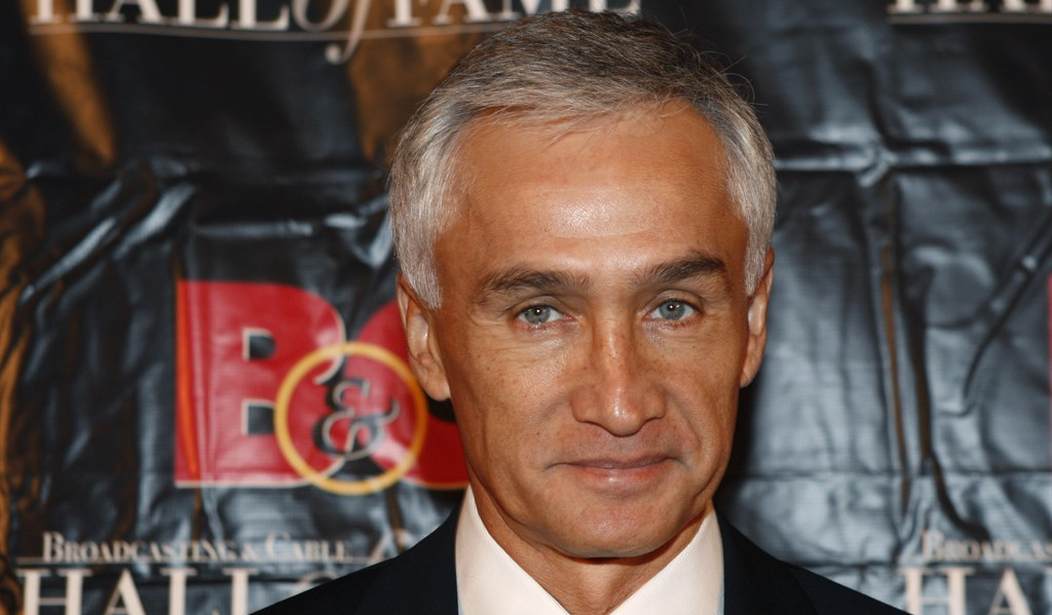In a recent Spanish-language interview to promote his new book “Stranger: The Challenge of a Latino Immigrant in the Trump Era,” veteran Univision anchor Jorge Ramos expressed his desire to return home to Mexico “for a while,” saying: “I would like to return to the country I left.”
The prologue of Ramos’s book sheds some light on why he might feel that way:
“There are times when I feel like a stranger in this country where I’ve spent more than half my life. I’m not complaining, and it’s not for lack of opportunity. But it is something of a disappointment. I never would have imagined that after having spent thirty-five years in the United States, I would still be a stranger to so many. But that’s how it is.”
After expressing his gratitude that he has been able to enjoy the fruits of free speech and a free press as an American citizen, Ramos clarified the importance of his Mexican heritage:
“[N]one of this erases where I came from. I was born and raised in Mexico, and I will never cease to be Mexican. I love the solidarity of the Mexican people; it is a wonderful nation, one in which you will never feel alone, with a magical and incomparable history.”
In contrast, Ramos sees America as a more hostile and hateful place after Trump’s election:
“This is not a book about Donald Trump. But his entry into politics and his rise to power are directly related to the growing anti-immigrant sentiment thriving across the United States. It’s as bad as I’ve ever seen it since I first arrived here in 1983. It’s as if Trump has given people permission to attack immigrants and make racist remarks, just as he has done.
“Words matter. And the problem isn’t limited to Trump: there are the sixty-three million Americans who voted for him and who, in many ways, think as he does. Yes, hatred has been brewing since Donald Trump stepped into the world of politics, but we cannot accept or normalize it.”
Recommended
Ramos goes on in the prologue to express happiness that Trump’s “apparent attempt to halt the demographic change” in the United States is “going to fail” because a July 2015 Census report found that more than half of “all infants under the age of one had been born to minority parents.”
On March 19th, Peruvian journalist and television personality Jaime Bayly interviewed Ramos to help promote this book, but he also challenged the Univision anchor on his journalistic credentials, ultimately getting Ramos to admit that his work is heavily tinged by political activism [translation from MRC Latino, emphasis mine throughout]:
BAYLY: I believe you are an activist against racism, a topic that you are very sensitive about. You are an activist in favor of immigration, legal and undocumented. You believe it enriches, the mix is good.
RAMOS: Yes.
BAYLY: You are an activist who supports, for example, a free press, of not allowing authoritarian presidents to restrict the right of journalists to ask uncomfortable things. That is activism.
Do you not recognize that in that you are an activist?
RAMOS: Let’s see. It’s that I believe the great danger…my first answer, upfront, is no. I am a journalist, not an activist.
(…)
RAMOS: I think what is important here is to understand that the definition of a real journalist, a complete journalist, is one who at a given moment is willing, Jaime, to take a stand.
Elie Wiesel, the Holocaust survivor who recently passed away, winner of the Nobel Peace prize, said that neutrality only helps the oppressor, never the victims and I believe that our vision of what it is to be a journalist does include what you define as activism, but I believe that more than activism, it is a humanitarian position, humanist, before certain things.
In the course of the interview, Ramos also argued that while “every country has the right to protect its borders,” that right can be trumped by a “humanitarian crisis”:
BAYLY: Do you agree to admit that a political leader that wishes to stop undocumented immigration, is not necessarily a racist?
RAMOS: Oh, of course, I think there are people…
BAYLY: Is it legitimate?
RAMOS: Well, I think that every country has the right to protect its borders and choose who comes and who doesn’t.
Now, you have to recognize that there are 250 million immigrants in the world, you and I among them, and most of the people here, and when there is a humanitarian crisis, that prevails, it seems to me, over the right of a country to protect its borders and not allow anyone in. I believe we are obliged to help the most vulnerable.
For more details about the interview and what Ramos said, check out MRC Latino’s report here.

























Join the conversation as a VIP Member